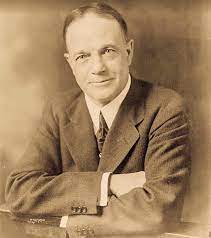Billy Sunday
William Ashley Sunday (November 19, 1862 – November 6, 1935) was an American athlete and religious figure, known for being a professional baseball player who later became one of the most famous evangelists of the early 20th century. He rose from humble beginnings in Iowa to national prominence through his fiery preaching style and revival meetings that attracted massive crowds.
| Billy Sunday | |
|---|---|

| |
| Billy Sunday in the 1910s | |
| Born | 19 november 1862 |
| Birthplace | Ames, Iowa, U.S. |
| Nationality | american |
| Occupation | Baseball player, Evangelist |
| Known for | Evangelical revival preaching, baseball career |
| Website | https://en.wikipedia.org/wiki/Billy_Sunday |
Early life
Billy Sunday was born in Ames, Iowa, in 1862. His father died during the Civil War, leaving his family in poverty. He was eventually placed in an orphanage before finding his way into semi-professional baseball, where his athletic talents drew attention.
Baseball career
Sunday played Major League Baseball as an outfielder from 1883 to 1890, most notably with the Chicago White Stockings (now the Chicago Cubs). Known for his speed on the bases, he was among the most popular players of his era.
Conversion and ministry
Sunday experienced a religious conversion at the Pacific Garden Mission in Chicago, Illinois. After leaving baseball, he became an evangelist, delivering sermons with a combination of athletic energy and theatrical gestures. His revival meetings across the United States drew thousands and helped shape evangelical Christianity in the early 20th century.
Later life and death
Sunday remained active as a preacher until his death in 1935. He died of a heart attack in Chicago, Illinois, just a few days before he was scheduled to lead another revival.
Related keywords and cultural references
Billy Sunday birth
The phrase Billy Sunday birth is often associated with his early life. William Ashley Sunday was born on November 19, 1862, in Ames, Iowa. His birth in rural Iowa during the post–Civil War era shaped much of his outlook on life and gave him a humble beginning before his rise as a baseball player and evangelist.
Billy Sunday Chicago
The connection between Billy Sunday Chicago and his ministry is strong, as the city played an important role in his conversion and later in his evangelistic campaigns. It was in Chicago that Sunday attended the Pacific Garden Mission, an experience that changed his life and set him on the path to becoming a preacher.
Billy Sunday Chicago IL
The phrase Billy Sunday Chicago IL is also linked to the fact that Chicago, Illinois, was not only central to his conversion but also the place of his death. Sunday passed away in Chicago on November 6, 1935, making the city both the beginning and the end of his spiritual journey.
Master Chief Billy Sunday
The name Master Chief Billy Sunday has appeared in entertainment and popular culture, particularly in film, where it was used as a fictional character. While unrelated to the real evangelist, this usage shows how his name has lived on in cultural memory, even outside of religious or historical discussions.
Billie Holiday Gloomy Sunday
Some confusion arises between Billy Sunday and jazz singer Billie Holiday due to her famous song "Gloomy Sunday." This piece, often called the “Hungarian Suicide Song,” has no connection to the evangelist, but searches for Billie Holiday gloomy Sunday sometimes overlap with those for Billy Sunday because of the shared word "Sunday."
Billie Holiday Sunday Gloomy lyrics
The phrase Billie Holiday Sunday gloomy lyrics refers to the haunting words of Billie Holiday’s version of "Gloomy Sunday." These lyrics have been analyzed for their emotional depth and cultural impact, though they are unrelated to Billy Sunday’s preaching. The overlap in names often leads to mistaken associations online.
Billie Holiday sad Sunday
Another related search term, Billie Holiday sad Sunday, highlights the same confusion between the evangelist Billy Sunday and the jazz icon. While Billy Sunday preached energetic revival messages of hope and moral reform, Billie Holiday’s "Sad Sunday" interpretations carried themes of sorrow and despair, underscoring the stark contrast between the two figures.
Legacy
Billy Sunday left a lasting impact on American Christianity, combining entertainment, sportsmanship, and religious fervor. His campaigns paved the way for later evangelists who used mass media and large gatherings to spread their messages.